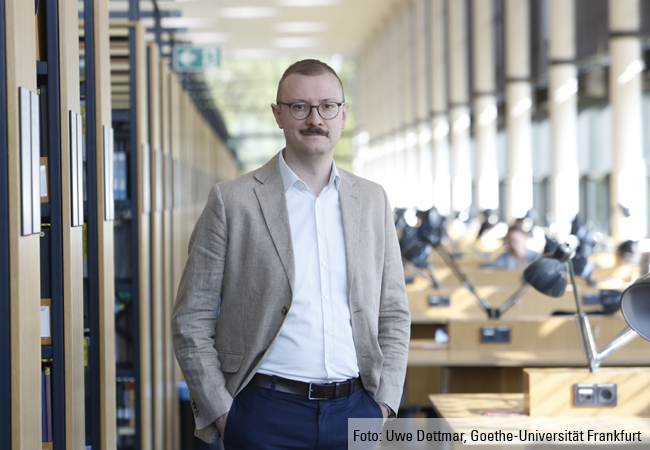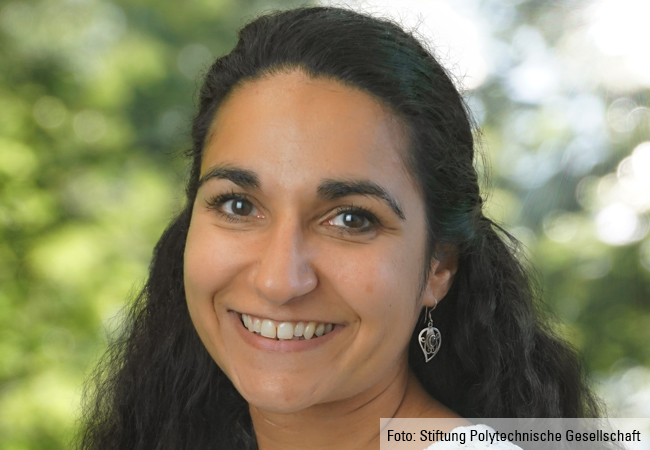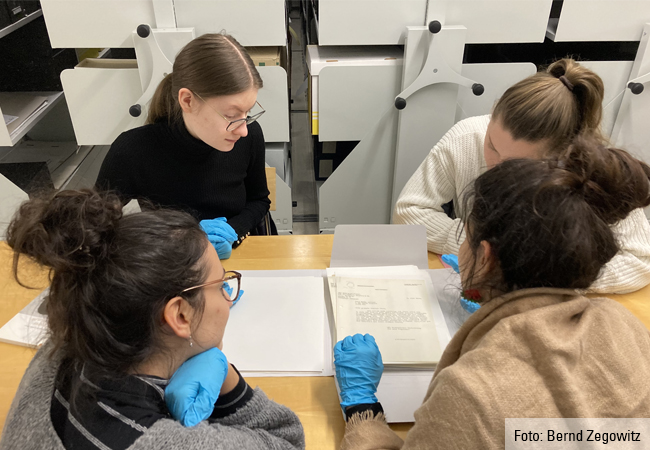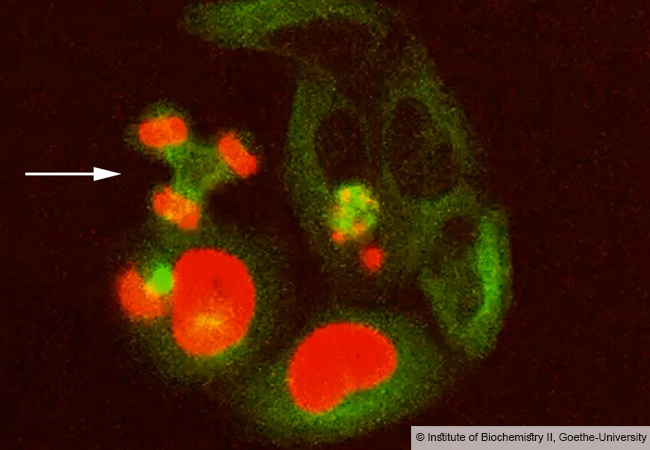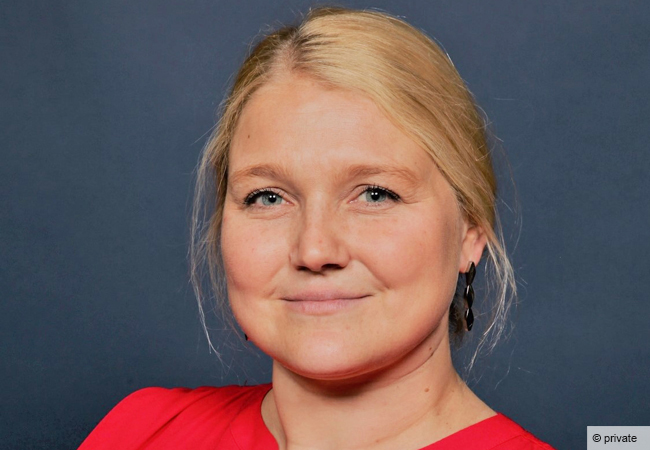Findings from the third Goethe University Frankfurt student survey
The third university-wide student survey was conducted in the 2022/23 winter semester. It is an important instrument that enables students to participate in the quality development of studies and teaching. A special thank you goes out to the 7,765 respondents to the extensive questionnaire, which included 314 general and additional faculty-specific questions. You can read about the survey results in the reports: Third university-wide student survey www.studierendenbefragung.uni-frankfurt.de.
Goethe University Frankfurt has a very diverse student body. It is a place where students from different backgrounds converge – with figure 1 below illustrating this heterogeneous composition. On the one hand, this colorful student body enriches teaching, but on the other, it also constitutes a challenge. To what extent these characteristics influence student satisfaction can be an indicator for a learning environment that is sensitive to such heterogeneity.
Student satisfaction is one of the university’s key priorities, as it not only reflects its quality as an educational institution but also has a significant influence on students’ academic success. The results of the third university-wide student survey show that – at 84% – most students at Goethe University Frankfurt are satisfied with their studies. This marks a slight increase compared to the 2020 summer semester (80%). At the same time, however, the figure has not yet returned to its pre-pandemic level (2018: 87%). In addition, 82% of respondents state that they would choose their degree program again, while 83% said they enjoy their subject and identify with the content (88%). Detailed multivariate analyses show that five key factors have a significant influence on student satisfaction, albeit to varying degrees: Satisfaction with the overall design and structure of the degree program has the greatest influence on overall student satisfaction. In second place are a sense of direction and students’ satisfaction with their personal academic performance. In addition, the feeling of social integration and the experience of autonomy both have a positive effect on general satisfaction.
By contrast, the heterogeneity characteristics mentioned in the survey, such as gender, employment or childcare, play no role in explaining satisfaction. The exception are students with health impairments, who are far less satisfied. Moreover, the results show that teacher training students are less satisfied than Bachelor’s, Master’s and State Examination students, while full-time students are more satisfied than part-time students. Students who have experienced discrimination are also less satisfied than those who have not. Fortunately, neither financial (in)security nor parents’ educational background have an influence on general student satisfaction.
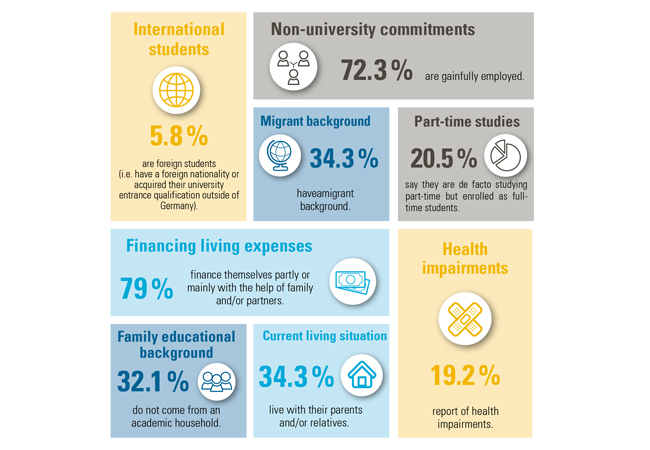
Although some of these diversity characteristics are significant, in the final analysis they only marginally contribute to explaining student satisfaction. Far more decisive are the five content-related and motivational factors mentioned in the survey, which statistically can explain to 45% why students are satisfied to different degrees. In contrast, the diversity characteristics only explain 2.6% of the differences (see Figure 2).
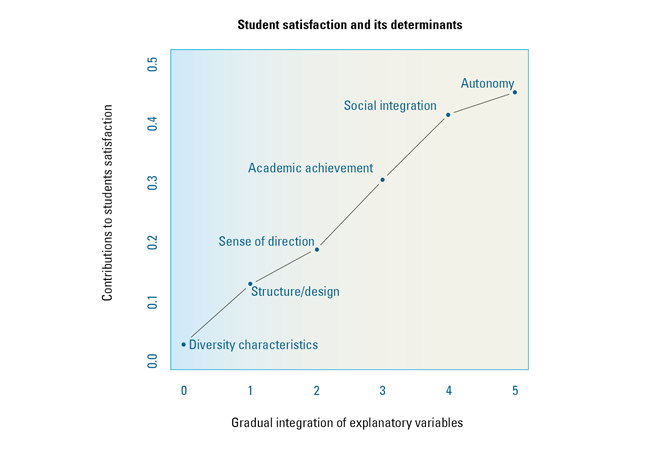
The results of the multivariate analyses underpin Deci and Ryan’s self-determination theory, which stresses that autonomy, social integration and competence are key motivational factors (cf. Deci/Ryan 1993: 229). In the context of student satisfaction, this means that the feeling of control over one’s own learning (experience of autonomy), the experience of solidarity and support from fellow students and lecturers (social integration) and the feeling of being competent (satisfaction with one’s own academic performance) correlate positively with student satisfaction. When students are in a position to fulfill these basic needs, they tend to be more motivated and consequently more satisfied with their studies, which in turn fosters learning success and benefits personal development (ibid.: 234ff.). Going beyond theory, the results show that satisfaction with the design and structure of the degree program and a sense of direction also contribute significantly to student satisfaction.
Our initial multivariate analyses suggest that heterogeneity characteristics only marginally contribute to explaining student satisfaction. These characteristics can nevertheless influence other important aspects such as academic success. To foster student motivation and satisfaction, the experience of autonomy, the feeling of being competent, social integration, the design and structure of the degree program as well as a sense of direction are very important.
That being said, the feeling of social integration especially has declined significantly among students in the wake of the coronavirus pandemic: While 75% of respondents still considered themselves to be socially well-integrated in the 2017/18 student survey, this figure dropped to just 59% in 2022/23. However, this impression relates above all to integration within the student body, as how students perceive their contact with lecturers and the university as a whole has not changed since the last survey.
Against this backdrop, the major challenge for Goethe University Frankfurt is to foster the experience of social integration among students and thus also student satisfaction and motivation. The university is already implementing measures to this end, such as Student Participation Day, held on May 29, 2024, the purpose of which was to highlight the many opportunities for student participation at the university and show how students can actively engage in the university’s structures.
Antonia Winkler, Philipp Nolden and Christoph Götz on behalf of the Statistics Unit
Further results can be found in the reports:
Third university-wide student survey
Summary of key findings (in German):
Universitätsweite Studierendenbefragung (Zusammenfassung)
Full report (in German):
Universitätsweite Studierendenbefragung (Vollversion)
Should you have any questions about the student survey, please feel free to con-tact us: sli-quikks@redaktion.de
Literature:
Deci, Edward L.; Ryan, Richard M. (1993): Die Selbstbestimmungstheorie der Motivation und ihre Bedeutung für die Pädagogik. Zeitschrift für Pädagogik 39 (1993) 2, p. 223-238.


